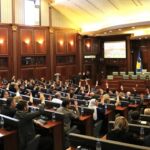In an article published on December 22, 1999, Angela Merkel distanced herself from “her political father” Helmut Kohl and the “black coffers” of the CDU party. With this step, she risked her political future, but saved the CDU.
Angela Merkel would never have become chairwoman of the CDU party or chancellor of Germany if she had not published her text in the daily Frankfurter Allgemeine Zeitung (FAZ) on December 22, 1999 , where she openly distanced herself from the former politics. Chancellors Helmut Kohl. In this text she distanced herself from her political mentor, who has strongly supported her in her career. She distanced herself from “her political father” and from “the father of German unification”, from the man who led the CDU party for 25 years.
But Kohl was also a politician who for years held a “black box” and stubbornly refused to reveal the names of secret donors. In this way he discredited the CDU party itself.
Helmut Kohl has “damaged the party”, wrote Angela Merkel. The party’s secretary general, then 45-year-old Angela Merkel, took courage and criticized the political “genie”, whom no one dared to publicly criticize, let alone open political clashes with him. It was a political bomb that exploded on the eve of the Christmas holidays, when the CDU was in a deep crisis.
“Black boxes”
In those nearly 200 lines in the newspaper, Merkel said she was shocked by the details of the “black box” affair – a system through which the CDU has been funded since the 1970s. With this criticism, Angela Merkel has risked her future. its political within the CDU party, where Kohl was very powerful. Shortly after the article was published, Merkel was found to be the target of criticism from Kohl’s supporters.
But on the other hand, her very accurate explanation of the issue and the demand for a catharsis – was seen as a lifeline for the party that was sinking into an even deeper crisis.
Party responsibility
“The actions, which Kohl himself has admitted, have harmed the party. The party had not published data for 1.5 to two million marks of donations, which have not been declared in reports … The party must justify that how is this possible “, writes Merkel for FAZ three days before Christmas 1999, comparing these scandals with some scandals that took place in the 80s, when the Flick concern, with the payment of donations, had increased its influence in institutions.
One of the main sentences of Angela Merkel’s open letter is that “the party – and not just him (Kohl) – must justify how such a thing was possible.” Merkel did not refer to anyone by name in this letter. She wrote in the plural and said “we” – we are responsible. Including myself.
Merkel did not forgive anyone for their political responsibility for illegal money laundering – not even themselves. Six weeks before the letter was published in FAZ, it became clear that Kohl was personally responsible for the “black box”. Helmut Kohl, the man who enabled the then-talented Eastern politician to rise to the top of German politics in the early 1990s, was now being attacked by herself.
“Historical letters”
Shortly after publication, her letter was given the epithet “historical”. In those days Angela Merkel, the woman who then took the post of chancellor where she is today, for 16 years in a row, risked her political future, risked everything.
Immediately on December 22, 1999, domestic opponents began calling her a “murderous father,” a “traitor,” a woman who “polluted the nest.” Many distanced themselves from it publicly. But there were also some who publicly supported him.
On Christmas Eve 1999, the then young Friedrich Merz, a member of the Bundestag, said: “I sign every sentence!” The media were also on Angela Merkel’s side. Over time, critics were increasingly silent, while supporters more vocal.
In the game all or nothing, Angela Merkel won. From favoring the party base, to the broad support of the German public. She became the face of the CDU, a “new CDU”, without burdens from the past, which also distances itself from Kohl and his turbulent affairs. But a party that recognizes Kohl’s historical merits for Germany.
Kohl’s silence
In an article published in FAZ, Merkel also criticized Kohl’s silence, as he stubbornly refused to publish the names of those who made secret donations, explaining that it was about “the credibility of the CDU and the credibility of political parties in general.” Merkel was of the opinion that only clarification of things could further strengthen the image of the party and Kohl’s own, as well as his historical role, and would also open up a perspective for strengthening the party.
Merkel did not apologize with this letter for Kohl’s omissions. But it achieved a kind of sobriety of the CDU, convincingly distancing itself from the “black coffers” and paving the way for the party to move forward.
CDU Lessons
The CDU must learn to walk again, it must begin to believe in itself and its capabilities, the political battle for its future must begin, Merkel wrote. Amid soft words of respect for her political mentor, Angela Merkel’s message to members of the CDU / CSU Union was clear: The era of Helmut Kohl is over. The CDU must be renewed if it is to survive. While black boxes should be extinguished forever. Only a few months later the CDU congress was held in Essen, in early April 2000. Angela Merkel was elected the first woman to head the CDU party – with 895 votes out of 937 people in the congress.
Five years later she was elected the first chancellor in the history of Germany.
/DW









